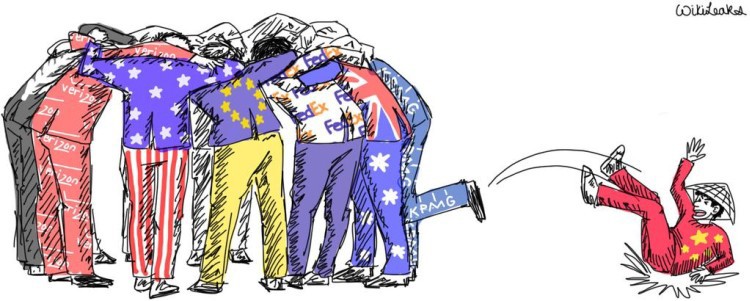Wikileaks has published 17 secret TISA international trade agreements

The main chapters of the Trans-Pacific Partnership Agreement (TPP) are not yet available in the public domain, and a fee has been assigned for them . But the Wikileaks website got 17 secret documents about trade agreements Trade In Services Agreement (TISA). In some respects, TISA agreements are even larger and larger than TPPs. For example, the TISA protocols were signed not only by the United States and its allies, but also by the European Union, which already increases their significance compared to TPP.
Together, TISA and TPP complement the strategic trinity TPP-TISA-TTIP. All negotiations are conducted without the participation of representatives of the BRICS countries (Brazil, Russia, India, China, South Africa), that is, the fastest growing economies in the world (not counting Russia). In a sense, these are negotiations of representatives of the "old economy" in the absence of the "young."
In addition to the United States and the European Union, 23 other countries are participating in the TISA negotiations, including Turkey, Mexico, Canada, Australia, Pakistan, Taiwan and Israel. Together, participating countries provide two-thirds of global GDP.
According to the informationfrom the website of the Department of Foreign Affairs and Trade of Australia, negotiations on TISA began in 2013. Their formal goal is to ensure “liberalization” in various fields, such as financial services, telecommunications, education, etc. See the full list of documents for a list of topics, including air traffic control systems, shipping, electronic commerce ( pdf ) and others.
It should be noted that in the countries of the "old world" industry makes up a small part of GDP, and "services" bring up to 80% of GDP, explains Wikileaks in a press release .
The current publication of 17 TISA documents occurred almost a year after June 19, 2014 the Wikileaks website published a TISA agreement on the financial industry, aimed at deregulating the financial sector of the contracting countries. This is despite the fact that the opinion was recognized by almost universal consensus: it was excessive freedom in the financial markets that caused the 2008 financial crisis. The current leak of files, including the new version of the agreement on the financial industry, indicates the unchanged course of the participating countries towards deregulation.
Another interesting point. Among other things, the TISA agreement contains a clause stating that “no participant can demand from a service provider, as a condition for the delivery of services or investments in this territory, the following: (a) use computer equipment located on the territory of the participant”.
This runs counter to Germany’s recent attempts to transfer public services to national data centers for security.
